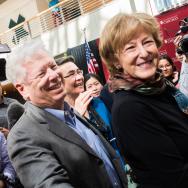Until Prof. Richard H. Thaler came along, economists resisted the idea of basing their models on how real people behave. The reality is people don’t always know what they want, much less what’s best for them.
In October, Thaler was honored with the Sveriges Riksbank Prize in Economic Sciences in Memory of Alfred Nobel for his pioneering scholarship in the field of behavioral economics. On Dec. 8, the Chicago Booth scholar delivered his Nobel lecture in Stockholm as part of a weeklong celebration of the 2017 Nobel laureates. He will receive his Nobel Medal on Dec. 10 at a white-tie-and-tails affair at the Stockholm Concert Hall. (Live webcast begins at 7:30 a.m. CST here).
In his Nobel speech, entitled “From Cashews to Nudges: The Evolution of Behavioral Economics,” Thaler told stories of various field experiments in his everyday life—ranging from a dinner party as a graduate student in Rochester, N.Y. in the 1970s to the Swedish government’s present-day effort to get its citizens to sign up for retirement plans.
“One lesson from these stories is that there are a bunch of things economic theory says we can leave out, and in fact, makes the strong prediction that they simply will not matter,” Thaler said in his Nobel address. “I call these ‘supposedly irrelevant factors.’ And really my research can be summarized as there are a lot of these supposedly irrelevant factors that are not irrelevant. They matter.”
Thaler launched his journey as one of the founders of behavioral economics with a bowl of cashews at a dinner party. He was concerned his guests were eating too many and that it would spoil their appetites, so he took them away. His guests, all economists, were happy when he removed the nuts, and that led to a discussion: How could they be happy, given that a first principle of economics is more choices are better than fewer choices?
He also recounted how he and Harvard legal scholar Cass R. Sunstein, coauthors of the best-selling book Nudge, discovered that a simple “nudge” is an effective way to influence choices without forcing anyone to do anything. The findings changed the way many companies set up employee retirement plans, for example automatically enrolling workers in a retirement plan and forcing workers to “opt out” if they don’t want the plan.
“If we learn from other social scientists, we can improve economics and increase its explanatory power, and it can give us new tools we can use to improve people’s outcomes,” Thaler said. “In short, we can nudge them.”
